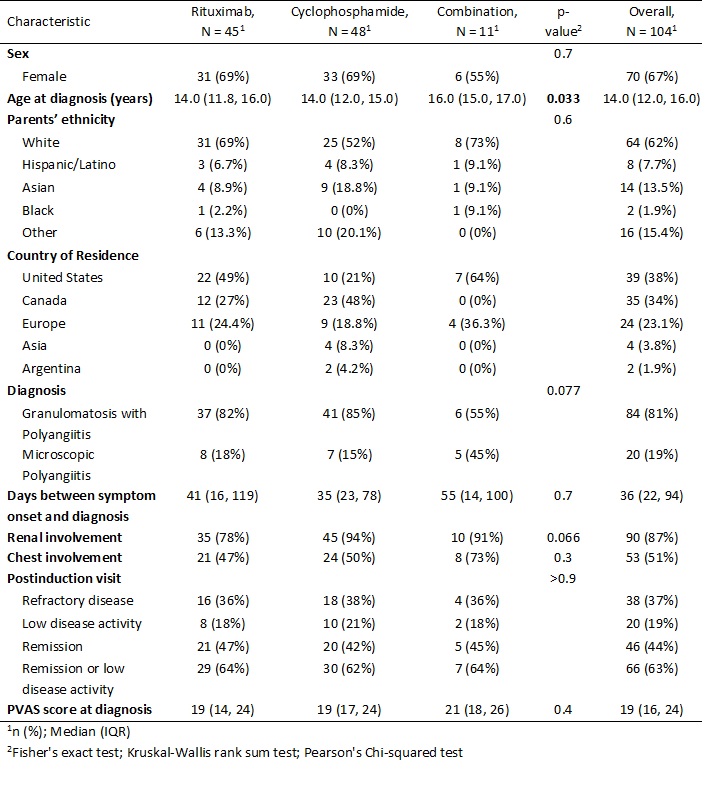Session Information
Session Type: Poster Session B
Session Time: 5:00PM-6:00PM
Background/Purpose: Granulomatosis with polyangiitis (GPA) and microscopic polyangiitis (MPA) are a group vasculitides with significant morbidity and mortality requiring toxic therapy. Clinical trials in adults have identified rituximab (RTX) as being an effective alternative to cyclophosphamide (CYC) for remission induction. As disease rarity in children limits the feasibility of pediatric trials, treatment data has been extrapolated from adult studies although efficacy and toxicity may differ in children. Here, we evaluate the efficacy and toxicity of CYC versus RTX through pragmatic, registry-based comparative evaluation.
Methods: From ARChiVe, a registry of childhood vasculitis, we identified patients with MPA or GPA who received induction with either RTX or CYC. We compared outcomes including rate of infection or drug-related hospitalization at 6 months and rate of remission and Pediatric Vasculitis Damage Index (pVDI) at 6 & 12 months. Remission was defined as Pediatric Vasculitis Activity Score (PVAS) ≤ 2 (inactive or low disease activity). Regression analysis was used for comparative evaluation of outcomes.
Results: 104 patients (median age 14 years) were included (81% with GPA). 43% received RTX, 46% CYC, and 11% received both RTX and CYC. Ninety of 104 had 12-month follow-up data. Initial PVAS score, diagnosis, and age at onset were similar across treatment groups. Overall, 63% and 72% of patients achieved remission at 6 and 12 months, respectively. There was no significant difference between treatment groups (p >0.9). Patients treated with RTX had a slightly higher odds of remission at 6 months, but this was not statistically significant (OR 1.07, 95% CI: 0.45,2.52). Hospitalization occurred in 18%; 22% of patients on RTX versus 10% on CYC although this difference was not statistically significant (OR 2.29, 95% CI: 0.73,7.16). The median pVDI at 12 months was one in both groups; patients receiving RTX had a slightly higher odds of a greater VDI, but this was not statistically significant (OR 1.06, 95% CI 0.47,2.36).
Conclusion: This is the first study comparing CYC and RTX for induction in pediatric GPA and MPA. No significant differences were shown between induction regimens with respect to rates of remission, severe adverse events, or degree of organ damage. Patients receiving RTX had more hospitalizations than those on CYC, but this was not statistically significant though there were a low number of hospitalizations overall. This study was limited by its sample size, retrospective nature, and lack of longitudinal adverse drug-related event data. Larger studies with longer follow-up are needed for increased precision in estimated differences between treatment regimens and reduction of uncontrolled confounding. These results represent an important early evaluation.
 Table 1: Patient Characteristics by Induction Medication
Table 1: Patient Characteristics by Induction Medication
To cite this abstract in AMA style:
Gagne S, Morishita K, Bosman E, Sivaraman V, Cabral D, PedVas Investigators F, Klamer B. Comparison Between Induction with Rituximab and Cyclophosphamide in Treatment of Childhood-Onset ANCA-Associated Vasculitis [abstract]. Arthritis Rheumatol. 2023; 75 (suppl 4). https://acrabstracts.org/abstract/comparison-between-induction-with-rituximab-and-cyclophosphamide-in-treatment-of-childhood-onset-anca-associated-vasculitis/. Accessed .« Back to 2023 Pediatric Rheumatology Symposium
ACR Meeting Abstracts - https://acrabstracts.org/abstract/comparison-between-induction-with-rituximab-and-cyclophosphamide-in-treatment-of-childhood-onset-anca-associated-vasculitis/
